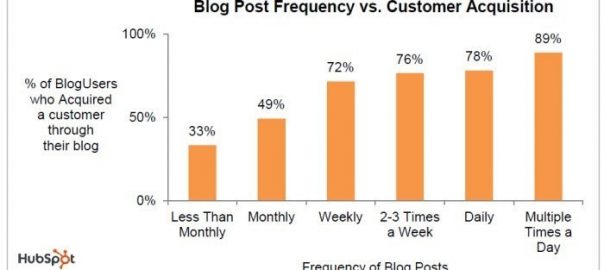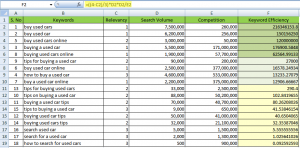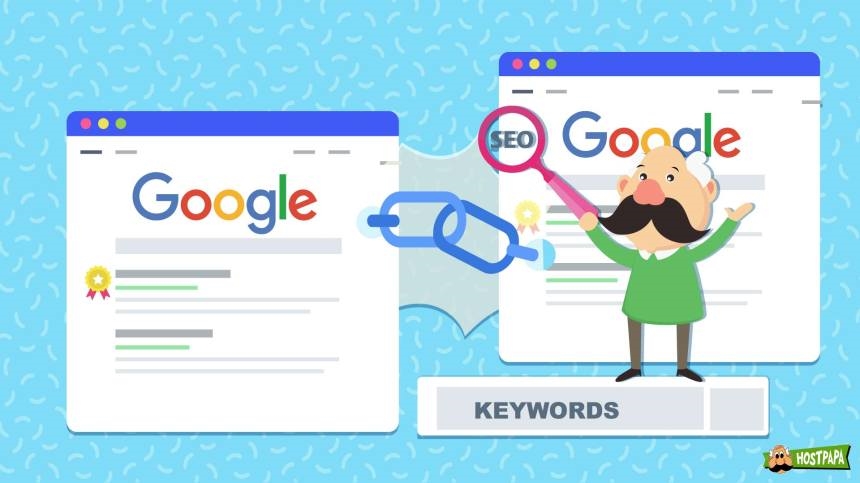 Image courtesy of Host Papa
Image courtesy of Host Papa
It’s quite amazing how critical content is for your digital strategy. Not only does content shared on your website improve perceptions about your brand but producing valuable content on a consistent basis underpins SEO efforts. That’s why a business blog is essential; increasing in importance every year.
SEO determines how you rank in search. Only a handful of links show on the first page of search results and we know folks rarely search beyond that first page. In fact, rank greatly impacts the number of visits you get from organic search, which is likely 50% or more of the traffic coming to your site. See the graphic below based on studies across many search terms. For each of the major search engines, more than 95% of visits generated by search go to links on the first page of search results (SERPs).
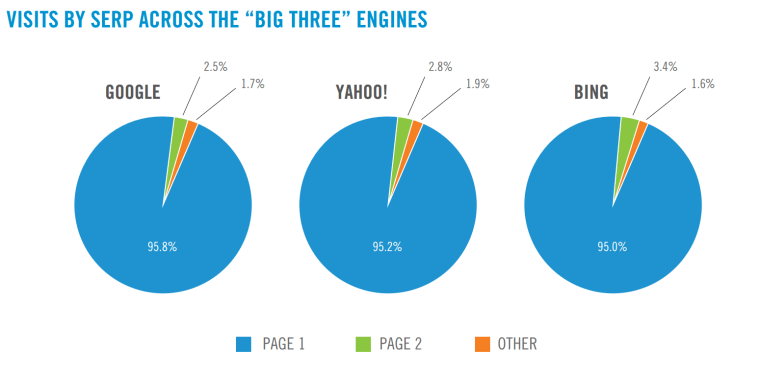 Image courtesy of Search Engine Journal
Image courtesy of Search Engine Journal
Why a business blog is essential
When you write fresh, valuable content on your website, you increase your reputation and generate more visits because:
- the content across your entire website gains value
- your content shows up higher when users search for things related to your site
- you gain valuable backlinks as other sites want to share the content you created
- social media users share your content they find valuable
- prospective customers engage with your content
- your market trusts you as a source of information
The result is you reach more consumers, generate more visits, improve consumer attitudes toward your brand, and sales increase.
If we have any doubters out there, here are results from a study by Hubspot showing performance gains by increasing the frequency of blogging.
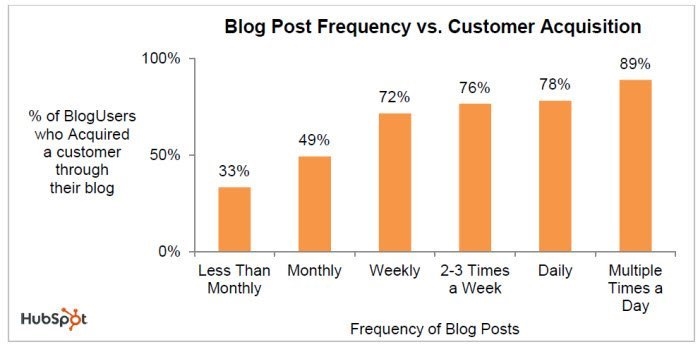 Image courtesy of Hubspot
Image courtesy of Hubspot
Who wouldn’t want to gain these valuable advantages and increase revenue?
Creating a business blog
Creating a blog isn’t hard. In fact, most websites contain a blog where they share educational, entertaining, and informative content. Maybe you answer customer questions or post information about how to get the most from your products. Maybe you review your product’s features.
Adding a blog to your existing website is only a couple of clicks away, as most themes support a blog platform.
Don’t have a website? It’s never been easier to create your very own website without having to write a single line of code. Using a CMS (content management system like WordPress or Drupal), a theme, such as those from Themeforest, and a few plugins to enhance functionality (such as Yoast for SEO, MonsterInsights for analytics, and JetPack, which supports multiple functions) you’re off and running in no time. If you need a little help, I created an ebook that walks you through the entire process from beginning to end with tons of helpful screenshots. Armed with the ebook, you can craft a website for about $ 100 in an afternoon.
Or, you can pay a developer around $ 1000 and turn over the entire process to them.
A word of caution, however. Using sites like Wix, Squarespace, and even WordPress (.com, which is hosting not .org which is the CMS), seems deceptively easy. In fact, it’s hard to get those free websites to turn out as you imagined as the plug-and-play they promise eases creation, actually limits your capabilities. A more serious problem with these options is they don’t support SEO the same way a self-hosted blog does, meaning you don’t rank well in search and you get a lot less traffic to your website.
Blogging
Below you’ll find a video by Neal Patel that steps you through how to write a blog post that both ranks well and promotes your business. The ebook I talked about earlier, also steps you through the process of creating a blog post.
Just to step back for a moment, your website consists of posts and pages. Posts are your blogging; the content you create on a consistent basis. Pages are kinda the background of your business such as your home page, about me and privacy pages, and e-commerce pages such as product pages, shopping carts, and check-out pages. Pages don’t change as often.
Technically, each post is a page to Google. The advantage of using a blog is it gathers all your posts in one place to make them easily searchable and to entice visitors on to the next post after finding a post through search or social.
Ways to use your blog
As mentioned, a business blog is essential, so what do you put in the blog?
1. Meet users’ interests
First, think about your niche and target markets to learn what they want to know or see from you. For a lifestyle blog, you want lots of pictures of clothing, makeup, and other related posts, like information on building a wardrobe. If you have trouble finding topics, try Google Keyword Planner, Google Trends, or Answer the Public to see data on user searches. Then, craft content related to those topics related to your business with the most searches.
2. Mix it up
Unlike blogs of years ago that were more journalistic, today’s blogs feature a mixture of content including text, images, infographics, and video. Note in this post, I included all these types of content. You may not always use every type of content, but be sure to spice up your text with images to keep visitors engaged.
Creating your own images, videos, and infographics is a great tool for building valuable backlinks, as other sites share your graphics.
3. Share on social media
In social, we break up sources of visitors into earned, owned, and paid. Owned social media visits come from content on your platforms. Earned visits come when a user shares your content so that it reaches their friends who might not follow your platform. Paid media involves paid ads on social platforms.
To gain visits from owned and earned media (which don’t cost you anything), you need content that encourages visits. Sharing your blog posts across your social platforms helps.
Paid social media, which obviously costs money, brings visitors matching specific criteria in terms of demographics, geographic, and psychographic to ensure you spend money to bring potential buyers to your site. Facebook Ads are a great tool for promoting your website, especially when you use native advertising. Employ native advertising on social platforms by crafting ads from your blog, using quotes from the content, or overlaying images from your content. For example, “10% of homes have frozen pipes in winter” might work for a plumber hoping to drive visits from homeowners in his/ her geographical area. You must target your content, on the right social media platform, to the right segment of users. Facebook Ads are very cheap since you only pay for clicks, which is constantly ranked as one of the most affordable marketing options for micro and small businesses.
4. Education goes a long way
We don’t say this often enough as business owners, but we can be teachers as well as salespeople. A customer who wants to know how to use your product in multiple ways, should not have to look for content other beyond your business blog. Don’t rely on media outlets, using their culture sections to review your product. You should write blog pieces that reflect the ways consumers use your products, how to use them effectively, even offer suggestions using your product, such as recipes and how-to videos.
Let’s say you sell rubber gloves. Consumers use your product in the kitchen when cleaning with bleach, but also when they’re changing the car oil, cleaning toilets, as sanitary gloves for a first aid kit, or perhaps even gardening. Writing an article such as “5 ways to use rubber gloves” gives customers an education before they make a purchase.
5. They’re fun!
A business blog is essential as they’re an open diary for business owners. Take a look at how Elon Musk, Tim Cook, and people like Oliver Zipse of BMW collaborate with blog owners. They do interviews with various industry blogs and that drives traffic to those articles. They’re fun reading that draws readers while also making these CEOs real to prospective buyers and positioning their brands as more approachable.
So why not use your own blog to do interviews with other business owners in the industry and make it a place for conversation? You might release information that no media outlets know about, which encourages them to link to your website. It’s always fun to be creative with your blog and think of new ways to drive traffic to your insights.
Business blogs are irreplaceable especially now. They can be a source of information, education and fun. Don’t underestimate how important they are now in 2020 lockdown!
Digital & Social Articles on Business 2 Community
(13)
